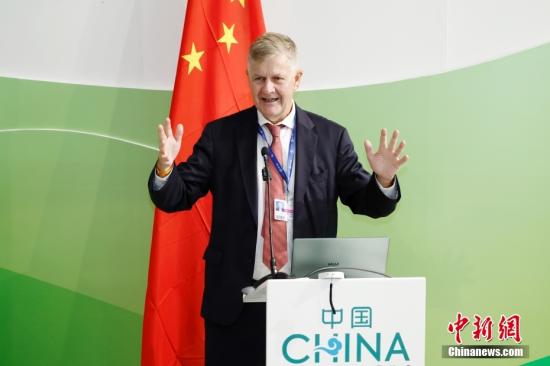(W.E. Talk) Former UN Under-Secretary-General: China’s green transition fascinates the world
By Lin Zhuowei, Chen Tianhao, Xue Lingqiao
(ECNS) -- The 29th Conference of the Parties to the United Nations Framework Convention on Climate Change (COP29) took place from November 11 to 22 in Baku, Azerbaijan. This pivotal event highlights the global focus on climate change, particularly from developing nations, as they seek solutions and hope for significant progress.
At this critical juncture, how can developing countries enhance their voice in global climate governance? How does China’s green transformation pave the way for global sustainable development? In this edition of “W.E. Talk”, Erik Solheim, former UN Under-Secretary-General and executive director of the United Nations Environment Programme, joins Wang Binbin, founding director of Climate Future Global Innovation Lab at Peking University’s Institute of Carbon Neutrality and a Yale World Fellow, to discuss how China collaborates with the world to address climate challenges and build a greener future together.
Small but Significant: green projects yield big results
“China’s commitment to the transition to renewable energy is unwavering. For China, this is a historic opportunity,” said Wang Binbin, reflecting on China’s green transformation journey.
Noting that China has succeeded in improving air quality, Solheim commended China’s achievements in environmental protection. “China has successfully waged its battle for blue skies. Living in China now is a fascinating experience—bright sunshine, clear skies, electrified transportation, and world-leading progress.” He added, “These accomplishments were achieved in an incredibly short timeframe, which is truly astounding.”
“Now solar power is cheaper than coal anywhere in the world. So, you save on it if you go green,” Solheim observed. He attributed China’s global leadership in this area to its robust policies and frameworks.

According to a report by the International Energy Agency, China exports wind and photovoltaic products to over 200 countries and regions, helping developing nations access clean, reliable, and affordable energy. This has earned widespread international praise for China’s green initiatives.
Solheim noted China’s leading role in renewable energy and support for other developing nations through investments and joint projects under the Belt and Road Initiative, highlighting China’s contributions to energy transitions in countries like Brazil, Türkiye, and Uzbekistan.
Wang noted the growing presence of Chinese energy solutions in markets like Zimbabwe, where China offers affordable alternatives to Western brands. “A Zimbabwean ambassador once remarked how China’s development provides more choices for developing countries, empowering them to opt for cost-effective Chinese energy products.”
In recent years, China has explored more “small but smart” renewable energy projects. Wang emphasized that such projects focus on local needs, citing examples from Africa where solar equipment alleviates power shortages and customized tools address specific challenges.
“The word ‘precise’ best describes China’s aid to African nations,” Wang explained. “Unlike Western assistance, which often lacks dialogue, China’s approach reflects mutual respect and equality.”
Innovating collaboration: a blueprint for global green development
Climate change is a shared global challenge. Sustainable development, supported by frameworks like South-South cooperation, offers strategic opportunities to advance the UN’s 2030 Agenda for Sustainable Development.
Both Solheim and Wang highlighted the increasing assertiveness of the Global South in climate action. Solheim called for a dual strategy—leveraging existing platforms like UN climate negotiations while establishing new mechanisms, citing the BRICS framework, the Asian Infrastructure Investment Bank, and the Belt and Road Initiative as excellent examples of innovative cooperation.
Wang agreed, emphasizing the organic unity among Global South nations in addressing climate change.
“As a developing nation and a victim of climate crises, China is committed to assisting other countries in tackling this shared challenge under the South-South cooperation framework,” she said.
Solheim illustrated this with examples like the Chinese-built Mombasa-Nairobi Standard Gauge Railway in Kenya, the Ethiopia-Djibouti railway, and the Jakarta-Bandung high-speed railway in Indonesia, underscoring the developmental impact of such infrastructure projects.
Amplifying developing nations’ voice
For decades, the global order, dominated by Western nations, has sidelined developing countries, which represent over 70% of the world’s population. Addressing this imbalance is urgent.
Solheim argued that multipolarity is the inevitable trajectory of 21st-century geopolitics. He believes that the challenges and conflicts of our time demand solutions rooted in multilateral cooperation among diverse nations, advocating for reforms that empower developing countries with a stronger voice.
Wang emphasized that green development offers a pathway for developing countries to enhance their influence through ecological civilization narratives.
“Developing nations must train professional negotiators who understand their unique challenges,” she said, noting the current reliance on negotiators from developed countries who often lack local insights.
Moreover, Wang highlighted the need to bolster scientific contributions from developing nations.
“The growing number of research papers from China and other developing countries signifies their rising influence in authoritative scientific discussions,” she said, underscoring the importance of amplifying their voices in shaping global climate policies.

